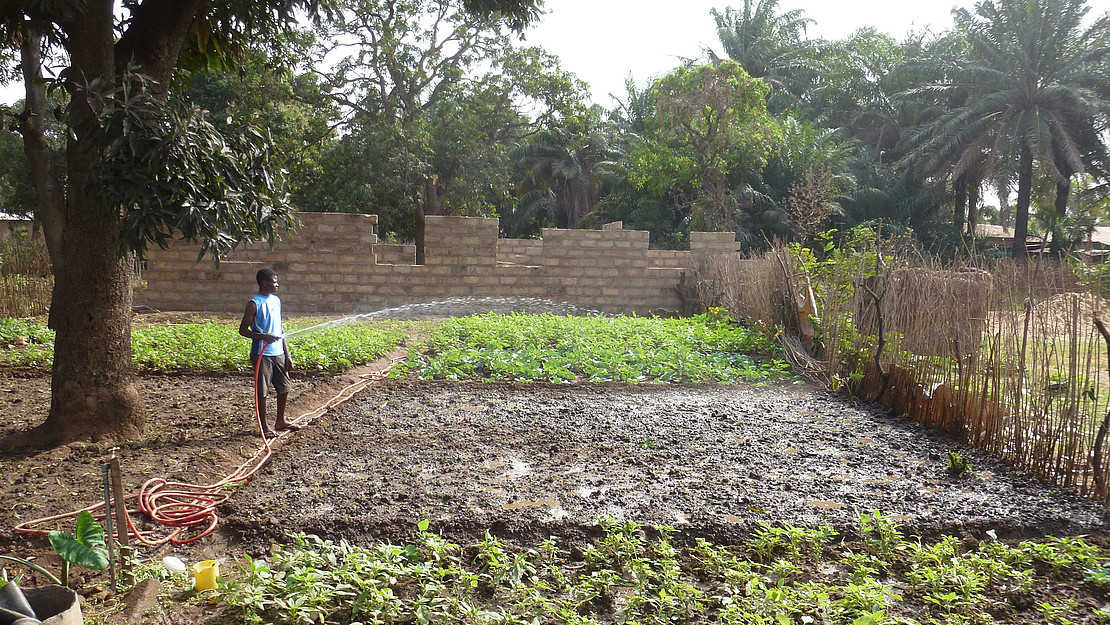This page contains automatically translated content.
German-West African network promotes new generation of scientists
 Image: Andreas Bürkert.
Image: Andreas Bürkert.Pro-RUWA stands for "PromotingAcademic Capacities for Sustainable Agricultural ResourcesUsein WestAfrica" and Ruwa means "springboard" in the West African Hausa language. Accordingly, the goal of the German-West African network is to train a new generation of young scientists and decision-makers. The aim is to enable them to become involved regionally and internationally in companies, public institutions and research facilities in order to meet the complex societal challenges that require inter- and transdisciplinary research and knowledge transfer.
Project partners in Africa are the University of Abomey-Calavi near Cotonou in Benin as the coordinating anchor institution, the University Nazi Boni in Bobo Dioulasso, Burkina Faso, and the University Abdou Moumouni in Niamey and its branch in Agadez, Niger. The network also cooperates with the DAAD-funded centers ICDD (International Center for Development and Decent Work) and GNP (Global Partnership Network) at the University of Kassel. Other partners include the Potsdam Institute for Climate Impact Research (PIK) and regional centers such as WASCAL (West African Science Service Centre on Climate Change and Adapted Land Use) with its DAAD-funded initiative climapAfrica (climate change research in Africa) and WAC-SRT (West African German Centre for Sustainable Rural Transformation).
The network is not least the result of decades of research in the West African region, to which members of the Department of Ecological Agricultural Sciences at the University of Kassel, in particular Prof. Andreas Bürkert and Prof. Eva Schlecht, have dedicated themselves. "Some of the African colleagues in Pro-RUWA started their academic careers here in Witzenhausen, as PhD students in our research groups," says Prof. Schlecht. "We are very pleased to see that they are now taking academic leadership roles in their home countries and that we can continue to work with them as independent partners."
Pro-RUWA uses a matrix approach in which participating university departments pool their expertise to offer the applied master's program Climate Sensitive Resources Management and a modular doctoral program (Graduate Academy) in agricultural sciences. The programs will be bundled into the joint Graduate School for Sustainable Resources Use and Food Security. As indicated by these titles, the course content focuses on current agricultural and economic challenges posed by increased climate variability and change, soil erosion, water scarcity, and loss of agrobiodiversity, as well as weak infrastructure and reckless resource exploitation. By addressing issues of local and regional food security, national food self-sufficiency, and the development of transnational agricultural value chains, Pro-RUWA aims to empower its students to take a holistic approach to these problems and promote sustainable development in the region at both the practical and academic levels.
Across the three African universities, the project will train three cohorts of approximately 16 doctoral and 90 master's students over the first five years. Particular emphasis will be placed on the use of digital teaching formats and overcoming the language barrier between Anglophone and Francophone countries. Mandatory, problem-oriented internships in the private or public sector provide Pro-RUWA students with their first professional experience. Regular exchanges between faculty at partner universities, joint winter schools, and workshops will further enhance inter- and transdisciplinary capacities.
When well-educated decision-makers have relevant experience and have learned about innovative business models, scientific knowledge can be translated into employment and into the development of new sources of income. This helps to improve social and political conditions. By counteracting the so-called "brain-drain", the outflow of the best educated people, problem-oriented academic training, as promoted by ProRUWA, can also provide decisive impulses for sustainable development.
Further information: https://www.daad.de/de/der-daad/kommunikation-publikationen/presse/pressemitteilungen/neue-fachzentren-afrika/
To the English and French version of the press release:https://www.uni-kassel.de/uni/en/international-service/international-profile/university-of-kassel/latest-news/news/2021/03/15/pro-ruwa
Scientific contact:
Prof. Dr. Eva Schlecht
Head of the Department of Animal Husbandry in the Tropics and Subtropics
E-mail: schlecht@uni-kassel.de
Prof. Dr. Andreas Bürkert
Head of the Department of Organic Crop Production and Agroecosystem Research in the Tropics and Subtropics
E-Mail: buerkert@uni-kassel.de